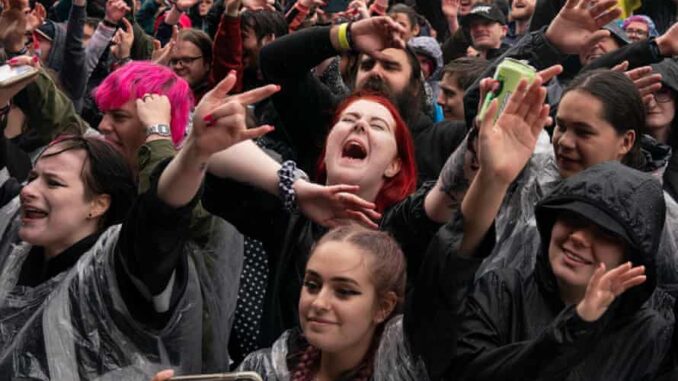
We might not be close to a post-pandemic society but we are, at the very least, entering into a post-lockdown one. The challenge facing us now is how to deal with the enormous loss of life we have collectively experienced, how to even begin to move on from something that has been traumatic for so many. Lots of people have proposed some kind of formalised collective mourning, perhaps a permanent national memorial or day of remembrance. But if we need a process of collective mourning (and I think we do), we also need collective joy: a national memorial service, followed by a raucous wake.
Collective joy, whether it takes the form of carnivals, festivals, protests, nightclubs, or Scottish football fans singing “you’re just a shite Rabbie Burns” at an unwitting statue of William Shakespeare, addresses a deep human need. It has the power to cut through isolation, and make us feel part of something larger than ourselves. Despite this, it’s hardly a prominent feature of modern life. What little of it there is is often expensive and exclusive: think of the steel fences that enclose £100-day-ticket music festivals. In the pre-industrial age, on the other hand, there was a feast day, carnival or festival just about every week. According to the historian EP Thompson, “these occasions were, in an important sense, what men and women lived for.”
The difficulty is that over the past year, mass gatherings have understandably become tied up with anxieties about hygiene and disease. As evidence mounts that outdoor gatherings aren’t a significant factor in transmission, and more people are vaccinated, the case for their prohibition is weakened. But a certain censoriousness still hangs in the air. This cultural mood stretches beyond people sitting at home on their computers and deriding others having fun with their friends as “antisocial”.
Earlier this year, in just one example of a nationwide spate of antisocial behaviour crackdowns, Primrose Hill park in London was locked up at night in order to deter “loud and disruptive parties”. This measure was reportedly backed by Labour’s leader, Keir Starmer, which is entirely fitting given the recent noises his party has been making concerning “antisocial behaviour”, alongside its commitment to highlighting such social blights as teens hanging around on streets. Even the “kill the bill” movement, which targets a proposed law that will restrict protest, meaning the stakes are arguably much higher, is fundamentally a battle about what people have the right to do in the streets.
Any attempt to control public space will never be enforced fairly: for some people, simply existing in public is considered an antisocial act. This really is nothing new: elites have long feared the unruly crowd. Today these age-old impulses are being filtered through the prism of Covid safety and lent a sheen of legitimacy they often don’t deserve. The task we have now is figuring out how to disentangle reasonable concerns about public health from reactionary hostility to public gatherings. If we fail to do this, the spectre of Covid will continue to be used as a pretext to limit the possibilities of collective joy, long after this is necessary, just at the time we need it most.
As much as I’d like to imagine that all of my preferred leisure activities are de facto politically useful, mass revelry isn’t always an act of resistance. But the fact that it provides pleasure and meaning in people’s lives makes it a worthy enough end in itself. And while it’s not quite right to say that collective joy is rebellious, it’s certainly true that joy forms an important part of political protest. Just about every rally I’ve ever been to, no matter how serious the issue at hand, has featured singing, chanting and a powerful sense of fellow feeling. The fact that a protest can be a fun day out is important, because there is no better cure for despair than marching through a city with thousands of other people who care about the same injustices as you. “Sometimes,” writes Lynne Segal in her book Radical Happiness, “the strength we gain from moments of joyful solidarity lasts a very long time.”
The possibility of collective joy is something worth fighting for, which doesn’t mean that attempts to do so will always be perfect. Last weekend’s Save Our Scene rally brought thousands of people to the streets of London to defend the future of club culture and the nightlife industry. The journalist Ed Gillett reported that, “it felt clumsy and half-baked in places … [with] flimsy ethical justifications for just wanting to get trashed, but [it was] undeniably powerful and resonant despite that.” A better example might be London’s Trans Pride, which also took place last weekend, and saw thousands of members of a much-oppressed minority group take to the streets in a spirit of defiant celebration. In an event like this, the dichotomy between “protest” and “party” becomes meaningless. The ability to experience joy in the face of such hostility is in itself a courageous act.
While the language of antisocial behaviour often serves as a pretext for draconian policing, that doesn’t mean that no such thing exists. No one wants to be kept up by selfish neighbours having all-night parties in the name of a post-pandemic knees-up. But living in a society requires give and take. We have to make a space for collective joy, for fun, for things that might look “antisocial”, but actually constitute the most social we ever truly are. In the coming years, we will have to fight to reclaim public space, and I believe that civil disobedience, in the form of simply turning up and not asking permission, will have a role to play.
- James Greig writes about culture and society


Be the first to comment